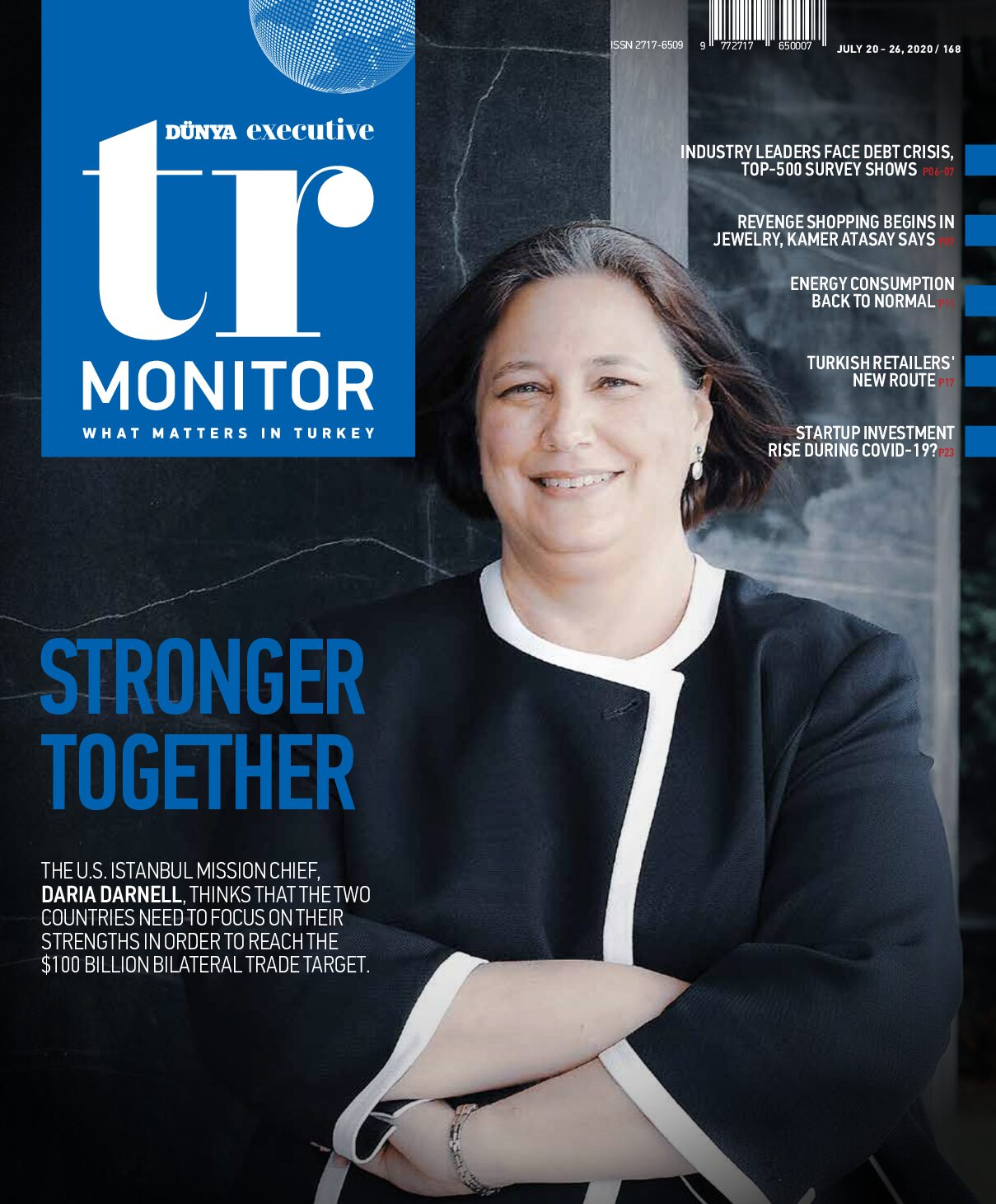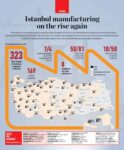TURKISH INVESTORS POURED $ 294 MILLION INTO THE U.S. LAST YEAR. U.S. COMPANIES IN TURKEY POSTED SALES OF $ 35 BN IN A YEAR.
By HUSNIYE GUNGOR
IT HAS been a year since Daria Darnell, the United States Consul General in Istanbul, took up her position, “obviously a strange one” for her because of COVID-19, making her “feel like she almost needs to start over.” However, this is not the case for trade relations between the U.S. and Turkey, which have been steadily ongoing amid political tensions that may arise from time to time.
Neither the consulate, whose main mission is to support businesses on both sides, nor the trade relationships took a break in the last couple of months because of the pandemic.
“Actually, we have been quite busy,” says the mission chief, who is happy that they are slowly starting on return to normal, in line with the Turkish government’s recommendations.
There is certainly no doubt that COVID -19 has changed a lot for a lot of countries and economies. But both Turkey and the U.S. are still committed to $100 billion bilateral trade goal, which was set by the presidents of the two countries, the consul general says.
“We were even able to see during the COVID -19 period that there were on going commercial trade relationships .” U.S. companies were able to purchase medical gowns from the Turkish companies, the government of Turkey talked to U.S. pharmaceutical firms about purchases of pharmaceuticals. “So, we look to each other to fill some of the economic needs that we have.”
To her, the most important common asset between the two countries is the mutually beneficial approach to business and the trade relationship, which is steadily on the rise. “We are looking at how we can increase the $20 billion we already do in trade even further to eventually get to this $ 100 billion target,” she says. At the moment, trade between Turkey and the U.S. is balanced, with $10 billion flowing in both directions.
300 PERCENT GROWTH IN ENERGY
Darnell thinks that continued growth can be expected in the areas where Turkey and the U.S. already have focus.
And focusing on the strengths of both countries will help more in achieving the trade target, for instance boilers and machinery in flowing both directions, or the export of aircrafts and aircraft parts for the U.S. and the export of vehicles and vehicle parts for Turkey.
“We continue to be interested and expanding energy sales in Turkey, which happen to be a real area of growth” Darnell, says adding that the amount of exports of LNG from the U.S. to Turkey grew about 300 percent between April 2019 and April 2020.
“That is clearly a major focal point for us, increasing energy exports from the U.S. to Turkey, and something that we will continue to focus on,” she notes.
As the main focus of the U.S. mission in Istanbul is mainly business, the consulate works closely with a range of business organizations such as the American Business Forum in Turkey (Am Cham Turkey/ABFT) and the Turkey-U.S. Business Council (TAIK). The U.S. Secretary of Commerce, Wilbur Ross, also met with the business community when he visited Turkey last September.
TURKISH FDI IN THE U.S.
The consul general believes that American companies have been great for Turkey, employing 75,000 Turkish workers. Just looking at ABFT companies, they had more than $35 billion in sales in one year. “So, there is this great partnership that we are able to have thanks to these organizations and we are fortunate that we are able to talk to them about what they see as challenges and opportunities here,” she says.
What about Turkish businesses in the U.S.? The consul general considers Turkey a real success story in terms of its foreign direct investment (FDI) in the U.S. A lot of Turkish companies have taken the lead in the U.S. market, she notes. Turkey now ranks 15th in terms of FDI, with $294 million flowing into the U.S. last year. TotalandAnd the numbers continue to swell, with Turkey’s current total FDI in the U.S. standing at $2.36 billion. Turkish sales, meanwhile, topped $700 million, according to 2016 figures.
TRADE IN BOTH DIRECTIONS
In terms of trade promotion, Darnell points to the foreign commercial service at the Istanbul, Ankara and Izmir missions of the U.S. has a special program called SelectUSA, which specifically helps Turkish companies get a start in the U.S. market. “Clearly Turkish companies have been able to look into the U.S. market and see some real advantages to setting up operations there,” she notes. “That’s exciting. When we talk about a $100 billion in trade or FDI, we want to see it in both directions, we want to see both of our countries benefit from this trade relationship.”
CHALLENGES FOR U.S. COMPANIES IN TURKEY
“There are a few areas that we certainly talk to the government about. U.S. Secretary of Commerce Wilbur Ross was really open about them in his September visit as well. We have some concerns about localization requirements for the production of pharmaceuticals and medical devices. Pricing structures, restrictions on internet access, import ban on refurbished parts and restrictions on exports of building materials from the U.S. to Turkey and taxing and regulations on technology industries are other areas of concern. However, we talk about it, to see in what ways we might be able to overcome these challenges.”
OPPORTUNITIES FOR U.S. COMPANIES IN TURKEY
DARNELL: “Energy is something that we clearly see an inexhaustible demand for. We would like to continue to see growth in agricultural exports and will continue to work on things like commercial space opportunities to the finance industry. General industry is one of the areas we can continue to corporate. The American businesses see a great location here. A lot of American companies, 60 of them, have regional headquarters here in Istanbul for that reason. They see advantageous demographics, a highly educated work force and very strong infrastructure system. These are the areas where Turkey can also have an advantage.”
COULD TURKEY REPLACE CHINESE IMPORTS?
DARNELL: This is in many ways of question of scale. The U.S. is an enormous consumer market. What industries will Turkey be able to ramp up? As far as current exports to the U.S., Turkey does very well in terms of machinery, boilers, car parts, vehicles, traditional textile industries like carpets, clothing, metal and precious goods. But there could be other areas as well.
IS U.S. TOURISM TO TURKEY POSSIBLE?
DARNELL: There is no restrictions on travel. And that will really be something for Turkey to decide how it wants to market itself during this period. Personally, I had a lovely visit to Kas during the 4th of July holiday. I have certainly tested the claim that Turkey is a lovely country. It has many wonderful sites. I really enjoyed that part of the Mediterranean.
FAVORITE DISH: CIRCESSIAN CHICKEN
Having been appointed as the U.S. Istanbul Consul General a year ago, Daria Darnell is not new to Turkey. She used to lead the Adana mission between 2009-2012. She has learned some Spanish, Slovak and Turkish in the 26 years she has spent at the U.S. State Department. Her favorite Turkish food is Circassian chicken, a classic mayo-free chicken salad with a creamy walnut sauce and paprika, garlic, green onions, and parsley and served as a mezze in the country’s drinking culture. Darnell says, for Circassian chicken, she goes to a meyhane, a place to drink raki with mezzes. But she can cook a version of lentil soup, which is another favorite Turkish food to her taste.
Darnell was fortunate before the end of February to be able to travel to some of the other provinces in her mission’s district and had hopes by this point to have visited at least two or three provinces and of course all of that has now been delayed. So, it has definitely been an unusual year from that perspective. Darnell will have two more years at the Istanbul mission. Looking at the Bosphorus from her residence in Arnavutkoy, she finds Istanbul wonderful as an experience defined by defined by the city’s location, by the fact that it is right there on the water. She likes the continuing and changing exhibits at Sakip Sabanci Museum.










